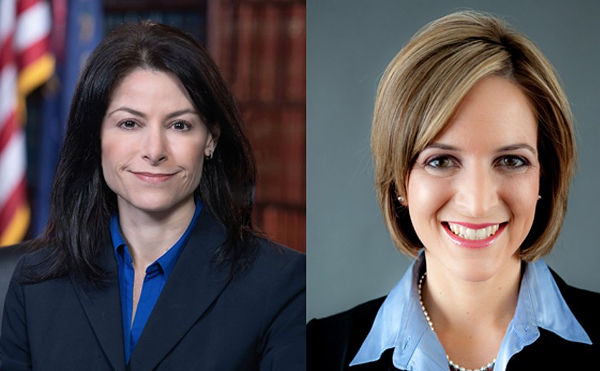
Audio By Carbonatix
[
{
"name": "GPT - Leaderboard - Inline - Content",
"component": "35519556",
"insertPoint": "5th",
"startingPoint": "3",
"requiredCountToDisplay": "3",
"maxInsertions": 100,
"adList": [
{
"adPreset": "LeaderboardInline"
}
]
}
]
Well, the New Hampshire primary results are in, and I just know that you have to be counting the days until our exciting Michigan Republican primary, which is coming Feb. 28.
Yessiree, if you were too busy standing in line at the soup kitchen, our fiscally prudent Republican Legislature last year happily voted to spend $10 million to hold this presidential primary, which is expected to help anoint favorite son Mitt Romney.
True, others might have wasted that money by instead trying to, say, keep part of our broken promise to our kids by funding the now-canceled Michigan Promise Scholarships.
But our leaders are made of stronger stuff. What's mildly embarrassing, however, is that they broke their own party rules by holding the primary this early. Except for a few elite states, such as Iowa, New Hampshire and South Carolina, neither party wants any state having a primary or a caucus before early March.
Why? To prevent the contest from ending too fast. In case you aren't familiar with how things work, nominees are theoretically chosen at the GOP and Democratic National Conventions. This year, the Repubs are meeting in late August in Tampa, the Dems in early September in Charlotte.
What's happening now, at least on paper, is that the candidates are competing for delegates in a series of primary and caucus contests in every state. Then the delegates will choose a nominee.
Long ago, the nominations were often actually decided at the conventions, sometimes after dozens of ballots. Back in 1924, the Democratic convention lasted for weeks and the delegates had to vote 104 times before they could agree on some guy named John W. Davis.
Theoretically, that still could happen. But it never does. What happens is that somebody wins a few early contests, which makes it easier for them to get money and attention. Losers see their money dry up, and are forced to "suspend" their campaigns.
The late Mo Udall, one of the funniest and nicest guys ever to run for president, said the contest was like a football game that was fair until one team made a first down. After that, it would take only five yards for them to make a first down, and their touchdowns all count as 21 points. Meanwhile, the other teams have to play under the regular rules. Guess who wins.
The last time there was any suspense at a national convention was in 1976, and as a result nobody pays much attention to them anymore. The parties don't like this, and they have decided to punish states like Michigan that break the rules. Accordingly, the Republican National Committee has taken almost half our state's convention delegates away, giving Michigan less voting clout than Mississippi.
State party leaders don't much care, because they figure the nomination will be decided long before the convention.
Democrats have been very smug about all this. They aren't participating in the primary at all. They only have one candidate, the president of the United States. They will choose which of their flunkies get to go to North Carolina, party and eventually vote for Barack Obama at a series of caucuses around the state May 5.
They now proclaim that Republicans should do the same. "Our decision not to hold a primary was not based on partisan politics. It was to save the state $10 million," said Mark Brewer, Democratic state chair since about forever. "We chose to hold a caucus in 2004, when the GOP had an incumbent president and we were selecting a candidate. ... The GOP should have done the same thing this year."
What he doesn't say is that part of the reason they didn't hold a primary eight years ago is that they couldn't control the outcome, and feared Republicans and independents might have gummed up the works by voting for someone other than their selected candidate, the always charismatic John (remember him?) Kerry.
Nor does Marvelous Mark mention that four years ago both parties willingly violated the rules and held a primary in the middle of January. Brewer and Jennifer Granholm figured Hillary Clinton was sure to win. They wanted to please her by being the first big state to give her a primary victory! National Democrats were furious.
She won, all right, helped by the fact that Barack Obama's name wasn't even on the ballot. Meanwhile, Michigan Republicans wanted to give favorite son Mitt Romney a boost. He won too. Whoopee.
Both the Clinton and Romney campaigns were over long before the national conventions, and instead of being a kingmaker, Michigan was the court jester. By the way, Obama did a whole lot better in November, and then went on to save the auto industry. Granholm, on the other hand, ended up being an adjunct college teacher instead of a cabinet member.
However, there is an election that almost nobody knows about, and which the Michigan Democratic Party hopes you don't discover. It is called the Michigan Democratic presidential primary.
Yes, Motorhead, there is one, with one name on the ballot: President Barack Obama. But the official Democratic establishment, which didn't want you to vote for him four years ago, really doesn't want you to vote for him now. Here's why.
They don't want to lose half their delegates. They want to pick them instead in caucuses, and official party rules say anyone who votes in this primary will be ineligible to vote in the caucuses.
Democrats are incensed that Secretary of State Ruth Johnson, a Republican, insisted on putting Obama's name on the ballot. But it is hard to see how she could have done otherwise. The law establishing the primary slyly contained the provision that she had to include on the ballot any candidates being mentioned in the media.
The only way someone in that category could keep their name off was by swearing that they were not a candidate for president.
President Obama is not about to do that. Plus, since taxpayer money is being used to pay for a primary, I don't see any way the Legislature could fund a primary for one party and not another.
Once I learned about all this, I wondered: Is there any way the Democrats could actually prevent someone who voted in the Democratic primary from showing up and voting at the caucuses?
Almost certainly, no. The caucuses are going to be on a Saturday, and it isn't going to be practical (or even possible) for one of Brewer's operatives to call over to Alpena City Hall to see if Joe Blow showed up and asked for a Democratic primary ballot.
So voters who bother to show up Feb. 28 will in fact have three choices: They can ask for a Republican ballot, they can ask for a Democratic ballot — or they can ask for a non-partisan one in cases where other elections — school board contests, say — are being held.
Here's what I suggest. Ignore what the party apparatchiks want. If you support President Obama, go to the polls Feb. 28, get a primary ballot and vote for him. Then go to the caucuses in May and do it again. If anyone tries to stop you, ask: "Let me get this straight: You want to keep me from voting for the president we both support because I already voted for him in a legal election?"
If nobody votes for the prez in the primary, there's always a chance that some crackpots will write in Lyndon LaRouche. So listen to Uncle Jack, save the Democratic establishment from itself — and go vote. Twice.





